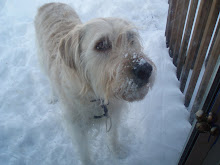So who are they? John, Paul, George, and Ringo. The Beatles! If you aren't in tune with i-Tunes, then you may not know that the Beatles catalogue has just been released on i-Tunes. Last week there was a major advertising push online, and my Apple homepage was pushing it it daily. It worked! Even after 40 years, the Beatles were last week's #1 seller in digital downloads. Their music has endured for two generations. Very impressive.
When it comes to writing music, King David was the Beatles and Elvis all wrapped into one! He was a prolific songwriter. In total, we believe he wrote at least 73 Psalms. Who knows how much more music he wrote never made it into the Bible. Some of you reading may be wondering about the Psalms...aren't the Psalms only poetry? Yes, but they are so much more! The book of Psalms are a collection of music. Israel's music. Worship music. David was a great warrior. He was also a skilled leader and shepherd. And yes, he was chosen by God to be king over Israel. But to me, his most interesting and enlightening gift was his songwriting. When David's heart spoke, it came out as music. If he lived today, his best friends might be Clapton or Taylor Swift. He would hang out with Springsteen or U2. He might collaborate with Usher or Coldplay. At his deepest core, I think David would call himself a musician before anything else.
So, during Advent, we are studying a few of David's musical works. And we will continue to look at them as we continue studying David's life after Christmas. I want to share a few points about the Psalms to help you navigate as we proceed. Maybe the first thing to say is that the Psalms were written in Hebrew. They are beautiful and poetic in our English translations, but they are masterpieces of literature in the Hebrew. The writers use complex patterns and rhymes. They create acrostics and parallelism and word plays. Many of these are virtually impossible to see in our English translations.
There are several categories of Psalms...anywhere from 3 to 10 or more "types" of Psalms. To me, it is best to see 3 main categories and a lot of sub-categories. Understanding the "type" of Psalm you are reading helps you understand it better. One type is simply a PRAISE or THANKSGIVING Psalm. "Shout for joy to the Lord" - Psalm 1oo. "Praise the Lord, O my soul..." - Psalm 103. Psalms that START with praise are usually in this category. Another type is a Psalm of INSTRUCTION. These can also be labeled as Psalms of wisdom. Psalm 1 is an example. Finally, the most common type...LAMENTS. Or, as I have labeled them in our sermons so far: BLUES. "My God, my God, why have You forsaken me?" - Psalm 22. Anytime a Psalm starts with help me, forgive me, preserve me, HEAR me, O GOD, etc., those are Laments or Blues.
There are many sub-categories of Psalms. You may hear of the Songs of Ascent (120-134) or Historical Psalms (78). Penitential Psalms are a sub-category of Laments (15, 32, 51). There are Liturgical and Royal and Messianic. They key thing to know is that most Psalms overlap categories and types. Most Laments end with Praise and many Psalms of Instruction deal with issues found in other categories. Maybe the best way to tell is to pay attention to where the Psalm STARTS. What is the context? Why is the author writing this? What was going on to inspire this song? The blessing God gives us in the fact that David wrote so many is that we can answer many of these questions by studying his life. God gives us a great gift with David! We know his heart better than any other person in Scripture, because he poured it out in his songwriting. David's heart is an open book!
It is no coincidence that the Psalms are the most quoted Old Testament source in the New Testament. God LOVES music and poetry and art! Being a Christian involves understanding the TRUTH about this world and about God Himself. But, we must never forget that there is much more to this life than knowledge and truth. The Psalms point us to experience in light of the truth. The Psalms are devotional. They are sad and mad. They are reactions to life. They are emotional. And God ordained it all! I said this Sunday and it bears repeating. It tells us a lot about God in that He not only allows His people to question and criticize Him, but makes sure those find a place in His Scripture. God wants us to be honest with Him...and the Psalms are our guide in how to do that.
We don't have the original music that David wrote. But it probably doesn't fit into our culture today anyway (although I would love to go to a concert with David performing! Imagine him stopping and telling the story behind the song...that would be amazing!). Even though we don't have the music, we should still sing the songs! And we should write new songs! The Psalms shouldn't limit us in our expression...they encourage more! Two weeks ago, I encouraged you to hear the song "40"...based on Psalm 40. It is still on our Facebook page, in two versions:
I waited patiently for the Lord;
He inclined and heard my cry.
He lifted me out of the pit, out of the miry clay.
He set my feet upon a rock, and He made my footsteps firm...
He put a NEW song in my mouth...a hymn of praise to our God.
May it never be that only old songs come out of our mouths!
